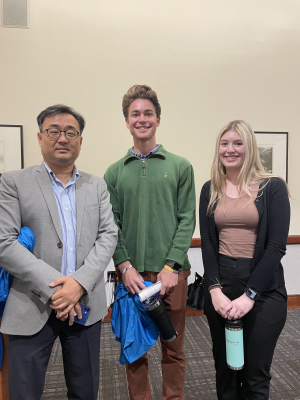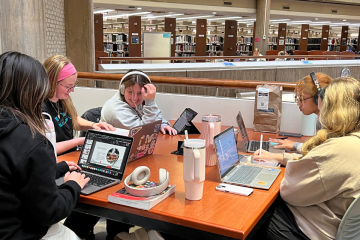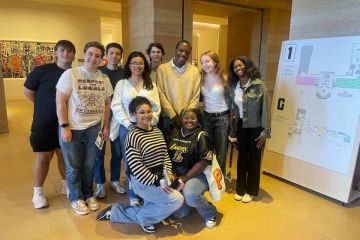The Business of Sustainability

From marketing and finance to supply chain processes, students in the School of Business Administration are getting hands-on experience putting sustainable practices into action to build a greener future.
Sustainability in Stores
Professor Brian Larson’s goal for his students is to not only prepare them for their careers, but to make them socially aware consumers. While using shaving as an example of this in class, he often found that students wanted to be more sustainable but didn’t know where to start. Working alongside Jeremy Hancher, adjunct faculty and Environmental Management Assistance Program (EMAP) manager for Widener’s Small Business Development Center, the pair took students to local shops with the goal of finding sustainable shaving products and analyzing consumer behaviors.
The groups visited five stores ranging from national big-box chains to small local businesses to look at the available selection of sustainable shaving products. The goal was to see how easy and affordable it is for consumers to choose products that are better for the planet.
“Organizations have a chance to demonstrate their sustainability by the products they carry. Initially that’s what this started with was how serious are organizations about really being sustainable. Are they putting products out there that are allowing consumers to be socially conscious,” Larson explained.
“I really enjoyed the field trips. It was nice to explore different parts of Chester as well as getting hands-on learning experiences,” said Bella Walker ’23, a business management major who participated. “My biggest takeaway was seeing how many choices we have as consumers and whether we make the choice to try and be environmentally friendly or not.”
Both Larson and Hancher impart on their students the importance of using their power as consumers to enact change.
“The students’ generation is the one who is responsible for questioning these companies and holding them accountable through voicing their opinions on social media or voting with their dollars through consumer choices,” said Hancher.
Sean Hourican ’24, an accounting major, shared that he finds himself making more sustainable choices now when shopping.
“This activity changed my thinking about sustainability since before this activity I did not think about seeking out and buying sustainable products, or even what products on the market were considered sustainable. I realize now that when I buy products, I should not only buy what is cheap or efficient, but also what is sustainable,” said Hourican.
Journey to the Shelves
Before a product can make it to stores, sustainable practices can be put in place, according to Assistant Professor Afrooz Moatari-Kazerouni, who’s research focuses on various aspects of the supply chain processes. Currently, she is investigating how sustainability can be implemented across supply chain parties, including manufacturing, suppliers, transportation, consumers, and more.
“We’re putting together a survey that will be sent out globally to report back on sustainability practices across supply chains,” Moatari-Kazerouni explained. “One of the outcomes will be a comparison between current business process management strategies, and ones in relation to sustainability capabilities.”
The goal of the project is to develop a resilient supply chain framework that not only can adapt and change as uncertainties arise in the global arena, but also assure standardized sustainability practices within the supply chain management culture. The researchers intend to publish their findings to help demonstrate how business processes could improve when it comes to sustainability and provide recommendations on how these improvements can be implemented, measured, and standardized.
“This work is particularly important as it relates to real-world issues due to the current state of the global supply chains,” said John Joseck ’23, an MBA student working alongside Moatari-Kazerouni. “Supply chains must be resilient to endure turbulent times. Recent disruptions including the COVID-19 pandemic, material shortages, and natural disasters have impacted business operations. This work will provide a framework to endure disruption.”
This was Joseck’s first time participating in academic research of this scope, and he emphasized that the knowledge and skills from this work are easily transferable to his current professional role in project and portfolio management.
“I have learned so much regarding supply chain operations, performance, and optimization techniques,” said Joseck. “I would definitely recommend other graduate students to seek out research opportunities. It is a great learning experience and very rewarding to see research that you complete turn into your own proposal.”
Environmentally Friendly Funding
At the root of all business is funding, and sustainability starts at the source with green investing - an umbrella term that refers to privately funded investments in climate, environmental, and sustainability-related projects with recent notable growth seen in the bond market.
“Green investing came out of the need to address the climate change that we face,” explained professor Babatunde Odusami.
Shea’lyn Hubbs ’23 worked alongside Odusami and other faculty and student-researchers to investigate the performance of green bonds amid various factors as part of Widener’s Summer Undergraduate Research & Creative Activities (SURCA) program in 2022.
“Our work with green bonds is important since it is now one of the primary strategies for advancing sustainability in the corporate sector,” said Hubbs, a finance and management double major. “This type of financing has made it possible for businesses to take a more positive approach to sustainability.”
Hubbs and her group studied the financial performance of green bonds by obtaining and analyzing data and concluded that green bond performances are likely to be influenced by many factors including the credit risk of the bond issuer, the payment pattern of the bond, and more.
“My biggest takeaway has been how powerful financial instruments, like green bonds, can be for promoting sustainability and addressing climate change,” said Hubbs.
The global emphasis on sustainability is only expected to grow as every industry works toward a better future. Exposing students to current and future developments in sustainable practices sets them off to be leaders in their fields and conscious consumers with their spending.
“I expect the demand for climate and sustainability specialists in the financial services industry and, indeed, all industries, will grow significantly in the future. And that should be exciting for students,” said Odusami.





